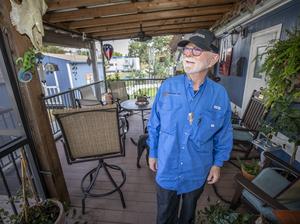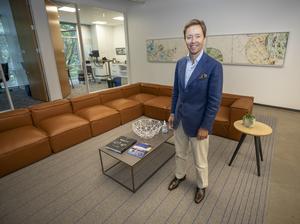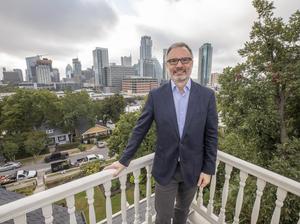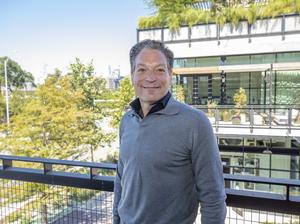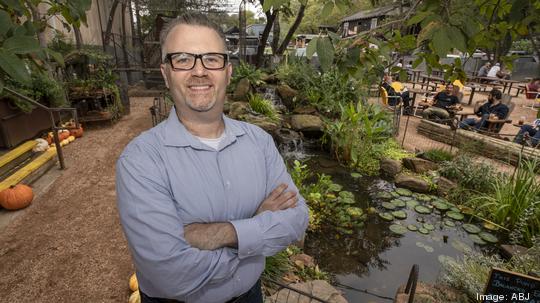
If you've been to more than a couple tech or startup events in Austin in recent years, it's all but certain you've crossed paths with Marc Nathan. It's also pretty likely that he has introduced himself, cataloged your name in his seemingly infinite mental Rolodex and connected you with a few other people he thinks might be simpatico.
That's his way. And he'll often spend a dozen hours a day further developing these links between Austin startup founders, venture capitalists, potential customers and journalists.
He's one of the few who have found there is actually a limit on how many LinkedIn connections you can have. And those connections aren't willy nilly. They are mostly people he has met and remembers, whether it was at an in-person event somewhere in Texas in the pre-Covid years or someone he connected with while video conferencing when we were mostly stuck at home.
Nathan, who works for local law firm Egan Nelson LLP connecting entrepreneurs and investors, runs circles around the Austin coffee shop circuit. On any given day, he's hosting an event at one or meeting someone, as was the case for this interview at Medici in The Domain.
"I would say if you're at the downtown Houndstooth in the Frost Bank lobby for more than three hours, you'll probably see 50% of the people that matter in the Austin startup community. They'll walk in and out at some point," he said.
But you'll also find Nathan hosting meetups at Houndstooth's Domain shop, out west at Uno Trattoria where many venture capitalists hang, at Coffee Shark off Highway 2222, or Mozart's or Halcyon or Cosmic Coffee or Radio. The list could go on.
"The Austin coffee scene is very, very strong," he said. "But this is a funny thing, a quirk about me – I don't drink caffeine, but I'm at coffee shops all day long. Just one of those weird things."
Avoiding caffeine makes sense for Nathan, who gets up around 4:30 a.m. each day to plow through 20 to 30 email newsletters. The early-bird strategy is one of his secrets, he said.
"It gives me my superpower. It gives me two hours of quiet time in the dark. The phone's not ringing, and I don't have crazy emails coming into my inbox," he said. "I can do all the reading that I want to do, or I can actually read the articles or read the blogs and do the study and really get into Twitter and really find out what the threads are."
Nathan will occasionally put together a complicated, adult-level Lego vehicle or enjoy an afternoon nap. But he says his real hobby is actually work.
"There's no time I'm ever off duty," he said. "I really get so far into reading about startups, talking to startups day in day out, that it's an 18-hour day job for me. Though it's not really a job because I love it."
Where did you grow up, and what's your coming-to-Austin story? Born and raised in Houston, Texas, went to school at University of Texas right after high school, stayed here for exactly five years, which is as long as took me to get a degree, came right back to Houston, and then moved back here in 2013-14.
What was the job? My father was an attorney back in Houston. When I was a senior in college, we started a small company together. He was a lawyer, helping early-stage companies raise money. I was essentially brought in initially as an intern, of course, but grew into a role as director of marketing to help some of these early-stage companies find capital. This is right at the height of the dot com boom in 1999-2000. I had no idea what I was doing. I still don't to a large degree. But I've been doing it for so long, with the same type of role, that it's going on 20 years now. So it feels natural. We formed a company called Bulldog Financial, and I ran that with him for eight years. He retired, and I thought it was time for a break for me and ended up joining a nonprofit organization called the Houston Technology Center, after volunteering there for many years. And that sort of helped cement my journey in the startup world.
What first got you interested in technology? My dad brought home one of the original TSR 80s from Radio Shack. He let me break it, and I did several times. He was always to technology. I always thought it was cool. I was never a sports guy, so I was always in there playing computer games or building computers. And that's actually what I did for money during college – build computers. And that got me through. I was certainly no Michael Dell, who had done that a couple years before and did pretty well before I did. So I wasn't gonna really do that. But, ultimately, I realized that technology was something very fascinating.
What are the general themes that you pick up from a failure versus success? I think the answer really is degree. Everything is about degree in that a great success is going to have a confident CEO, a great failure is going to have an arrogant CEO. What's the difference with arrogance and confidence? I don't know. That's a degree. There's a huge difference between a technology that works and a technology that thrives. What's that difference? I don't know. But there is a tipping point. So you have to make sure that whatever technology, whatever the thing you're building, has to do what it says and it has to do with it, say, at least in my mind, 25% better than whatever else on the market in order for you to actually lift your head above all the noise. So in my mind, it's about degree that's what really separates the wheat from the chaff or the winners from the losers.
Austin, obviously, has received a ton of attention for its startup scene for years. Do you think we've earned it? 100%. Austin has been the light and the shining place for the Texas technology scene for 25 years now. It was a sleepy small college town for many, many years. Many, many people at the Chamber of Commerce and other organizations brought a lot of people here 20-25 years ago to at least look at Austin as a real place for a second headquarters or a second office. That's how we originally got Apple, how we originally got Oracle and how we originally got some of these bigger players like IBM. So much credit is due to the city fathers and mothers 25 years ago to turn this into an overnight success. Austin has 1,000% earned its reputation.
The number one thing about Austin, the one thing that I've come to realize it's been true over and over, especially during this rush during COVID is that the Austin vibe is very easy to understand. We like to help and support each other. We love to see each other succeed. And that's very different from any other city. And we do it a lot, and it's something that we really care about.
What aren't we doing well – things we need to improve on? So the obvious Austin problems right now in 2021 are very simple: traffic and homeless. Housing affordability, and then equity – those are two secondary things. But the number one thing right now, just from a general perspective that people can see that I think we're fixing a little bit as our whole is our homeless issue, which is a terrible humanitarian problem. And our traffic issue, which is a terrible business problem. Other than that, I think Austin has experienced growing pains like any other city. We're no longer Austin anymore. We're Round Rock, we're San Marcos, we're Bastrop. I mean, we're becoming a Metroplex. A lot of people don't realize and don't think about it these terms. But Austin is a 10th largest city in the United States. And we got that crown year and a half ago. And it's not slowing down anytime soon. I think it's gonna be even bigger next year.
What are your tips for other people who are hoping to become a connector like you? What are some of the secrets to your success? I don't know if anybody wants to become like me. But, if they did, it's really, really simple. It's the easiest thing in the world to do. But it's not like flipping a switch. You just have to care about other people. That's number one, you have to start from a place of actually wanting to see them succeed. You also have to want to make sure that the connections you're actually providing are of value to both sides. If you're not moving the needle for both parties, you're wasting their time, and you don't want to do that. So, ultimately, I look for opportunities to help each other and to make sure people are strengthening those connections, much less making them. Because, ultimately, we're all in the same boat. We're trying to roll in the same direction. I just want to make sure that we're all doing it synchronously.
With your newsletter Texas Squared, you see hundreds of Texas stories. What are some of the trends you're noticing statewide? I typically parse about 1,400 to 1,500 stories a week to parse them down to about 250, which is still too many. And I recognize that. But ultimately, the trends I'm seeing are a lot of the smaller underserved towns, the Taylors of the world, the Planos of the world, some of the parts and pieces around Brownsville in the Rio Grande Valley, they're starting to take a page out of the Austin, Houston and Dallas book by setting up and starting up incubators and angel networks. Even Boerne, Texas, right outside of San Antonio, started with the Chamber of Commerce, turned it into an angel network, and now they're talking about a coworking space and incubator. That is amazing to see. The system works. It just has to be distributed. It's like William Gibson said, 'the future is here. It's just not evenly distributed.' We're doing that here in Texas, and we have some great examples with Capital Factory, Techstars, the DEC up in Dallas, even the ION down in Houston. The systems work, it's just a matter of connecting to people, which is where I come in.
If you can have dinner and drinks with any future past. Who would that be? I think that my funny answer for maybe not a dinner, but certainly after dinner, would be Bob Marley. Dinner, I think, would be Benjamin Franklin. Innovation to me is the most fascinating thing in the entire world – how people distill ideas and mash them up with different problems. That fascinates me. And that's what inventors do, all the way back to Leonardo da Vinci. And music innovations are the same thing. How do you mash up or take two different ideas and put them in the same thing and synthesize them and make something new and better?
Do you have a favorite Austin restaurant? The best restaurant I've eaten at in Austin recently is probably Aba Austin on South Congress. It's Middle Eastern food.
Do you have any books that you'd recommend? Sun Tzu's 'Art of War.' I really try to read a version of this once a year. And I'm not kidding. 'The Art of War' has so many life lessons. It's about war, but it's really about human psychology. It's really about power dynamics. It's really about how do you deal with people. I tried to read a copy that at least once a year. I have at least 12-13 copies of it.
Title: Vice president of client strategy at Egan Nelson LLP
Age: 44
Hometown: Houston
Education: University of Texas, graduated in 2000 with an RTF degree
Family: Wife, Joy; daughters Becca, 16, Naomi, 14, Julia, 12, and Hannah, 10
Connect: Texassquared.com or @Marc1919 on all social networks
